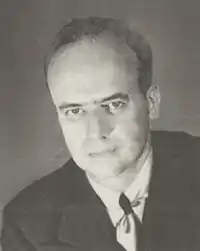Carleton Putnam
Carleton Putnam (December 19, 1901 – March 5, 1998) was an American businessman, segregationist, and writer. He graduated from Princeton University in 1924 and received a Bachelor of Laws (LL.B.) from Columbia Law School in 1932. He founded Chicago & Southern Airlines in 1933 which, in 1953, merged with Delta Air Lines. Putnam later served as chief executive officer of Delta Air Lines and held a seat on its board of directors until his death.[1][2]
Carleton Putnam | |
|---|---|
 | |
| Born | December 19, 1901 |
| Died | March 5, 1998 (aged 96) |
| Alma mater | Princeton University Columbia Law School (LLB) |
| Occupation | Businessman, segregationist, writer |
| Spouse(s) | Esther Auchincloss |
Life and career
Putnam was born to a prominent family from New England,[3] his mother Louise Carleton Putnam, was the daughter of New York publishing magnate George W. Carleton. Paternally, he was a lineal descendant of American Revolutionary War general Israel Putnam. He was also related to the physical anthropologist Carleton Coon, with whom he corresponded closely regarding theories of anatomical and biological differences between human races.[4] He was raised as part of the American Episcopal Church and remained a lifelong member.
His best known book is entitled Race and Reason (1961), an advocacy of racial segregation that originated in a letter he wrote to President Dwight Eisenhower protesting the end of segregation in U.S. public schools.[3][5] According to Putnam, the immediate impetus for his letter to Eisenhower was the concurring opinion of Justice Frankfurter in Cooper v. Aaron, 358 U.S. 1 (1958), which Putnam refers to as "the recent Little Rock case".[6]:5–6 Elsewhere in the book Putnam critiques Brown v. Board of Education, 347 U.S. 483 (1954), calling for its reversal.[6]:26, 108
Psychologist Henry Garrett wrote the introduction.[7] In this book, Putnam wrote:
In the next 500,000,000,000 years I would be quite prepared to concede the possibility the Negro may, through normal processes of mutation and natural selection within his own race, eventually overtake and even surpass the white race. [...] When the Negro has bred out his limitations over hundreds, or thousands, of years, it will be time enough to consider absorbing him in any such massive doses as would be involved in the South today.[6]:53
The mulatto who was bent on making the nation mulatto was the real danger. His alliance with the white equalitarian often combined men who had nothing in common save a belief that they had a grudge against society. They regarded every Southerner who sensed the genetic truth as a bigot [...]. Here were the men who needed to be reminded of the debt the Negro owed to white civilization.[6]:117
Putnam also wrote a biographical book on Theodore Roosevelt's youth that was praised by Edmund Morris, the author of the best known biography of that president. Putnam admired Roosevelt's belief that "Teutonic (and) English blood is the source of American greatness".[5]
Carleton Putnam died of pneumonia on Mar. 5, 1998. He was survived by his wife, Esther Mackenzie Willcox Auchincloss, a daughter, three grandchildren, a stepdaughter, and three step-grandchildren. He was previously married to Lucy Chapman Putnam.
References
- Jackson, John P. (2001). ""In Ways Unacademical": The Reception of Carleton S. Coon's The Origin of Races" (PDF). Journal of the History of Biology. 34 (2): 247–285. doi:10.1023/A:1010366015968. Archived from the original (PDF) on 2013-05-14.
The scion of an established New England family (and a cousin to Carleton Coon), Carleton Putnam was educated at Princeton and Columbia Law School in the 1920s. In 1933, Putnam established his own airline, building it into a successful business. After World War II, Putnam merged his airline with others forming Delta Airlines. [...] Putnam was convinced that the core problem with desegregation was the racial inferiority of the "Negro". Time and time again, Putnam claimed that the South was wasting its time with the call to defend "state's rights" and should instead focus on the true danger: race mingling. For Putnam, everything else was a side issue to the fundamental danger desegregation posed to continuation of white civilization.
- "Carleton Putnam '24". Princeton Alumni Weekly. The Trustees of Princeton University. May 20, 1998. Archived from the original on March 13, 2012. Retrieved September 19, 2012.
After Princeton, he became an aviation enthusiast. He earned his LLB in 1932 from Columbia Law School. Instead of practicing law, he turned a small California airline into a larger midwestern airline, Chicago and Southern, which merged into Delta in 1953. He was Delta's chairman of the board.
- Thomas Jr., Robert McG. (March 16, 1998). "Carleton Putnam Dies at 96; Led Delta and Wrote on Race". The New York Times. Retrieved July 1, 2019.
- Jackson, John P. (2005). Science for Segregation: Race, Law, and the Case against Brown v. Board of Education. NYU Press. ISBN 978-0-8147-4271-6. Lay summary (30 August 2010).
- Bradley, James (2009). The Imperial Cruise: a secret history of empire and war. Little, Brown and Company. pp. 332–333. ISBN 978-0-316-00895-2.
- Putnam, Carleton (1961). Race and Reason: A Yankee View. Washington, DC: Public Affairs Press. LCCN 61-8447.
- Winston, Andrew S. (Spring 1998). "Science in the service of the far right: Henry E. Garrett, the IAAEE, and the Liberty Lobby - International Association for the Advancement of Ethnology - Experts in the Service of Social Reform: SPSSI, Psychology, and Society, 1936-1996". Journal of Social Issues. 54: 179–210. doi:10.1111/j.1540-4560.1998.tb01212.x.
Works
- High Journey: A Decade in the Pilgrimage of an Air Line Pioneer (1945)
- Theodore Roosevelt: The Formative Years (1958)
- Race and Reason: A Yankee View (1961)
- Race and Reality: A Search for Solutions (1967)
Further reading
- Tucker, William H. (2007). The funding of Scientific Racism: Wickliffe Draper and the Pioneer Fund. University of Illinois Press. ISBN 978-0-252-07463-9. Lay summary (4 September 2010).